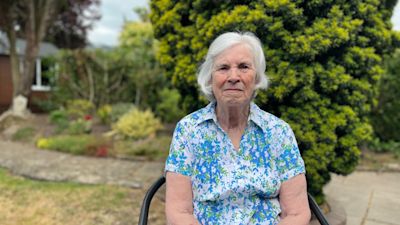Osteoporosis: Norfolk woman who fractured spine while sleeping calls for end to 'postcode lottery'

Watch Katie Ridley's report for ITV News Anglia
A woman who suffered five fractures in her back whilst she slept is calling for an end to the "postcode lottery" which allocates care for osteoporosis.
Alexandra Fuller from Norwich suffered a fracture in her back while she was asleep in June 2019.
After going to her GP she was then referred for an x-ray where she found out she had a fracture in her spine. But it wasn’t until Mrs Fuller referred herself to a private physiotherapist that she was told she had five spinal fractures.
“You just accept that this is something that happens but you don’t expect your bones are crumbling. You think it’s just bad luck, and that’s what I had a job to understand to start with - how could I fracture something when I hadn’t fallen?", said the 78-year-old.
Osteoporosis is a condition that causes bones to become brittle making them more prone to break. It currently affects around 3.5 million people in the UK.
Since her diagnosis, Mrs Fuller has been receiving help from the Royal Osteoporosis Society, a charity that supports people with the condition.
It is calling for more funding for the condition in places like Norfolk, where they currently do not have a fracture liaison service.
Such a service would provide assessments for people over 50 who break a bone to identify any underlying osteoporosis. It is estimated it could help more than 6,000 people a year in Norfolk and save the NHS over £2.5m in Norfolk next year.
The NHS said it currently does not have this service at the Norfok and Norwich University Hospital, but was working on providing it.
Craig Jones, chief executive of the Royal Osteoporosis Society, said: “The problem is that lots of parts of the country don’t have these fracture liaison services.
"People are breaking their bones because of this condition, they are being fixed up and forgotten about in fracture clinics, which costs the NHS a lot of money”
Mrs Fuller believes the service would have been vital to helping her and identifying the condition early.
"It concerns me greatly that there isn't a fracture liaison service where I live. If there was, I may have been diagnosed much earlier and it could have saved me from having multiple fractures", she said.
She now has to be careful when it comes to going out and has to rely on her husband Christopher to help her.
"It’s been very restrictive on our lives as well. If we are going out anywhere, first of all, we have to look to see what the chairs are like.
"It’s been a compromise from what we’d like to do, to what we can do," said Mr Fuller.